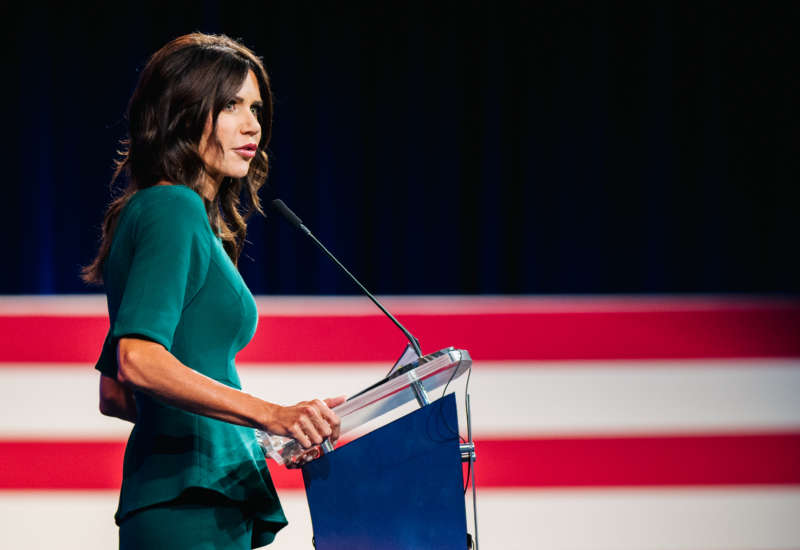LGBTQ+ rights advocates on Thursday condemned a new South Dakota law banning transgender students from playing on sports teams matching their gender identity.
The Sioux Falls Argus Leader reports Gov. Kristi Noem, a Republican with 2024 presidential aspirations, cited “fairness” as she signed S.B. 46, which mandates that scholastic sports teams from the kindergarten through collegiate levels be segregated by sex assigned at birth.
Mark Miller, Noem’s chief of staff and lead counsel, last month likened transgender athletes’ participation on school sports teams that match their gender identity to “terrorism.”
“You see it elsewhere and don’t want it to get to South Dakota,” he said.
The ACLU tweeted Thursday that “this cruel and dangerous bill is part of a coordinated attack on trans youth moving nationwide.”
BREAKING: South Dakota Governor Noem just signed into law the first ban on trans student athletes of the year.
This cruel and dangerous bill is part of a coordinated attack on trans youth moving nationwide.
This moment doesn’t end here. Trans kids need us all in the fight, now.
— ACLU (@ACLU) February 3, 2022
S.B. 46, which is the first bill of its kind to be signed into law this year, is set to take effect on July 1, although implementation could be delayed by legal challenges.
A second anti-trans measure, H.B. 1005, which would bar transgender students from using restrooms that correspond with their gender identity, was passed Tuesday by the South Dakota House and was sent to the state Senate for consideration.
Kris Wilka, a 14-year-old transgender boy who plays football for Harrisburg North Middle School in Sioux Falls, will be banned from his team if the new law takes effect.
“Sports is my life,” Wilka told NBC News. “My world revolves around football, and I don’t know if I would be able to function without it.”
“There aren’t more than a handful of kids in South Dakota to whom these sports laws would apply, according to the ACLU of South Dakota’s Jett Jonelis. These bills are solutions in search of a problem that does not exist.”https://t.co/FzaINiJFdC
— The Trevor Project (@TrevorProject) February 3, 2022
Human Rights Campaign state legislative director and senior counsel Cathryn Oakley said in a statement that “instead of focusing on the real issues affecting the people of South Dakota, Gov. Noem and anti-LGBTQ+ state legislators continue their relentless, baseless, and patently discriminatory attacks against transgender kids.”
“They show no shame,” she continued. “The governor’s eagerness to pass a bill attacking transgender kids reveals that her national political aspirations override any sense of responsibility she has to fulfill her oath to protect South Dakotans.”
South Dakota just became the 1st state in 2022 to ban trans youth athletes. There is nothing fair about the “fairness” bill – it does nothing to protect girls’ sports, and directly harms children who simply want to play sports with their friends. https://t.co/qLWdYPqjsl
— Athlete Ally (@AthleteAlly) February 3, 2022
“Gov. Noem and South Dakota legislators need to stop playing games with vulnerable children,” Oakley added. “Transgender children are children. They deserve the ability to play with their friends. This legislation isn’t solving an actual problem that South Dakota was facing: It is discrimination, plain and simple. Shame on Gov. Noem.”
According to the Human Rights Campaign, more than 250 pieces of anti-LGBTQ+ legislation were introduced in 31 U.S. states last year, with 17 new laws enacted in 10 states.
Our heart goes out to trans youth and their families in South Dakota, as it is poised to become the first state to enact a trans athlete ban. We know this moment is unspeakably painful, and we will keep fighting alongside you to ensure youth everywhere maintain the right to play.
— TransgenderLawCenter (@TransLawCenter) February 3, 2022
Hoera Kingi is an Oglala Lakota and Ngāti Kahungunu transgender two-spirit woman. The non-binary two-spirit identity has been acknowledged and revered by Indigenous peoples for centuries before white invaders conquered what is now South Dakota.
Testifying against S.B. 46 last month, the former high school cheerleader said that not being able to compete on sports teams “would’ve been devastating to me.”
“It would’ve stopped me from meeting my favorite people and [making] my most cherished memories,” she added.


